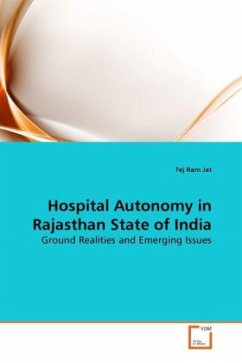Governments in many developing countries are struggling with limited resources to meet the basic health care needs of their populations. Health sector reforms are implemented in this regard to achieve efficiency and address inequity in health care delivery. Hospital autonomy is an important innovation under health sector reforms. It has received significant attraction of policy makers in several countries. This book presents a critical review of the conceptual framework of hospital autonomy in the context of public hospitals in Rajasthan state of India. It also presents a comprehensive case study of General Hospital, Chittorgarh and illustrates the impact of autonomy in terms of effect on efficiency, equity, quality of care and utilisation of health care services. The book highlights ground realities, policy challenges and emerging issues. It also offers recommendations for strengthening hospital autonomy in developing countries.
Bitte wählen Sie Ihr Anliegen aus.
Rechnungen
Retourenschein anfordern
Bestellstatus
Storno








